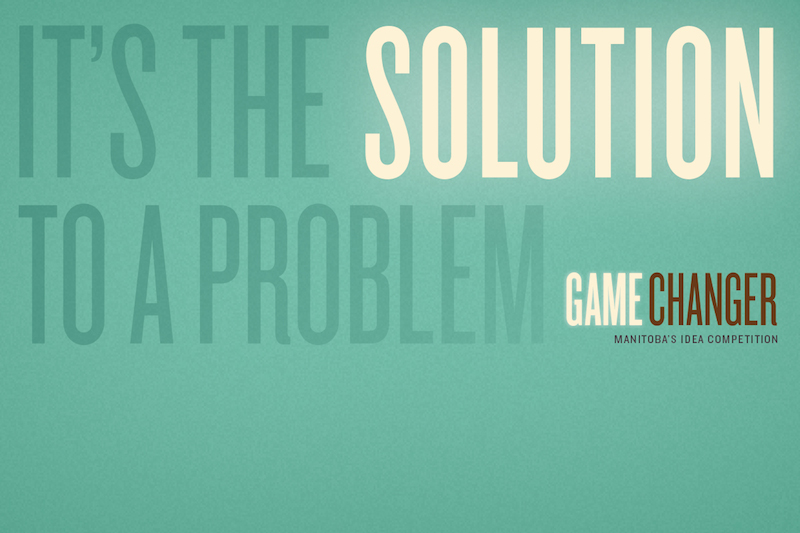
Game Changer team finalists have been chosen
Game Changer, a unique two-phase competition, began in September when students from all departments and faculties were encouraged to submit an idea – one that identifies practical, real-world challenges and has potential to enact positive change if a solution was found. Five problems were chosen from seventy-seven submissions and teams of cross-faculty students submitted their solutions last week.
The seven finalist teams (addressing four of the five problems) will now move forward to the final competition on Thursday, February 11, 4:00 pm – 7:00 pm in EITC Atrium. The solution entries were scored based on novelty of solution; clear and concise (no scientific jargon); feasibility and ease of implementation; scalability; entrepreneurial spirit; cross discipline members; sustainability; and innovation.
The problems and teams tackling them are:
CLIMATE: How can we reduce CO2 emissions in the transportation of goods?
Team Cause-Not-Corp (CMC)
Anita Balakumar (Law), Shivoan Balakumar (Community Health Sciences/Health Sciences), Emily Baron (Psychology/Arts), Kenny Hong (Computer Science/Science)
Solution: Creation and marketing of a certification mark (similar to the recycling logo, organic labels, fair trade, GMO, etc.) that recognize companies who have taken significant steps to reduce their CO2 emissions in the transport of their goods.
FOOD: How can food waste be reduced in order to make quality food available for all?
Team Foodie
Amy Dytnerski (Community Health Sciences/Health Sciences), David Moskal (Management/Asper School of Business), Gary Tong (Computer Science/Science), Brandy Pantel (Community Health Sciences/Health Sciences), Aimee Bowcott (Community Health Sciences/Health Sciences)
Solution: Reduce food waste at the food retail level through the redistribution of quality surplus food at our discounted food store, EveryBody Eats.
Team Nixed Foods
Oluwaseyi Odhigbo (Human Nutritional Sciences/Agricultural and Food Sciences), Ifeanyi Nwachukwu (Human Nutritional Sciences/Agricultural and Food Sciences), Zara Usman (Economics/Arts), Oribim Kingson (Human Nutritional Sciences/Agricultural and Food Sciences)
Solution: An innovative strategy to reduce food waste at different stages of the food value chain, from producers to the final consumers.
Team UMANGOES
Laura Pelser (Human Nutritional Sciences/Agricultural and Food Sciences), Nancy Barajas (Supply Chain Management/Asper School of Business), Fernanda Alabat (Food Science/Agricultural and Food Sciences)
Solution: UMANGOES is a social mission that aims to turn waste into profit, provide sustainable employment and opportunity for the people of Usulatan, El Salvador.
HEALTH: Technology promotes sedentary lifestyles, which leads to obesity. How can we change this?
Team Thrive
Danielle Fenn (Fine Arts/School of Art), Ryan Croy (Kinesiology and Recreation Management), Kristin Flattery (Fine Arts/School of Art), Kelly Campbell (Fine Arts, School of Art)
Solution: Empowerment Health, a holistic health management app designed from an Indigenous wellness perspective
MEDICAL: How can we detect early-onset Alzheimer’s disease before there is irreversible damage?
Team AlzHack
Omid Ranjbar Pouya (Biomedical Engineering/Engineering), Andriy Rudnyk (Asper School of Business), Mohammad Asefi (Electrical & Computer Engineering/Engineering)
Solution: A cloud-based Game Suite for early-onset Diagnosis of Alzheimer’s disease
Team Biohack
Paul White (Biomedical Engineering/Engineering), Ahmad Byagowi (Electrical Engineering/Engineering), Jesslyn Janssen (Biology/Science)
Solution: Our solution is a two-pronged approach to diagnose Alzheimer’s Disease. We propose to use a finger prick blood test in combination with a Virtual Reality spatial navigation test.
Join us at the finale event to hear the team presentations and vote for the People’s Choice award!
Thursday, February 11, 2016
4:00 – 7:00 pm
EITC Atrium
Please RSVP to gamechanger@umanitoba.ca
For further details visit: umanitoba.ca/gamechanger
Research at the University of Manitoba is partially supported by funding from the Government of Canada Research Support Fund.






